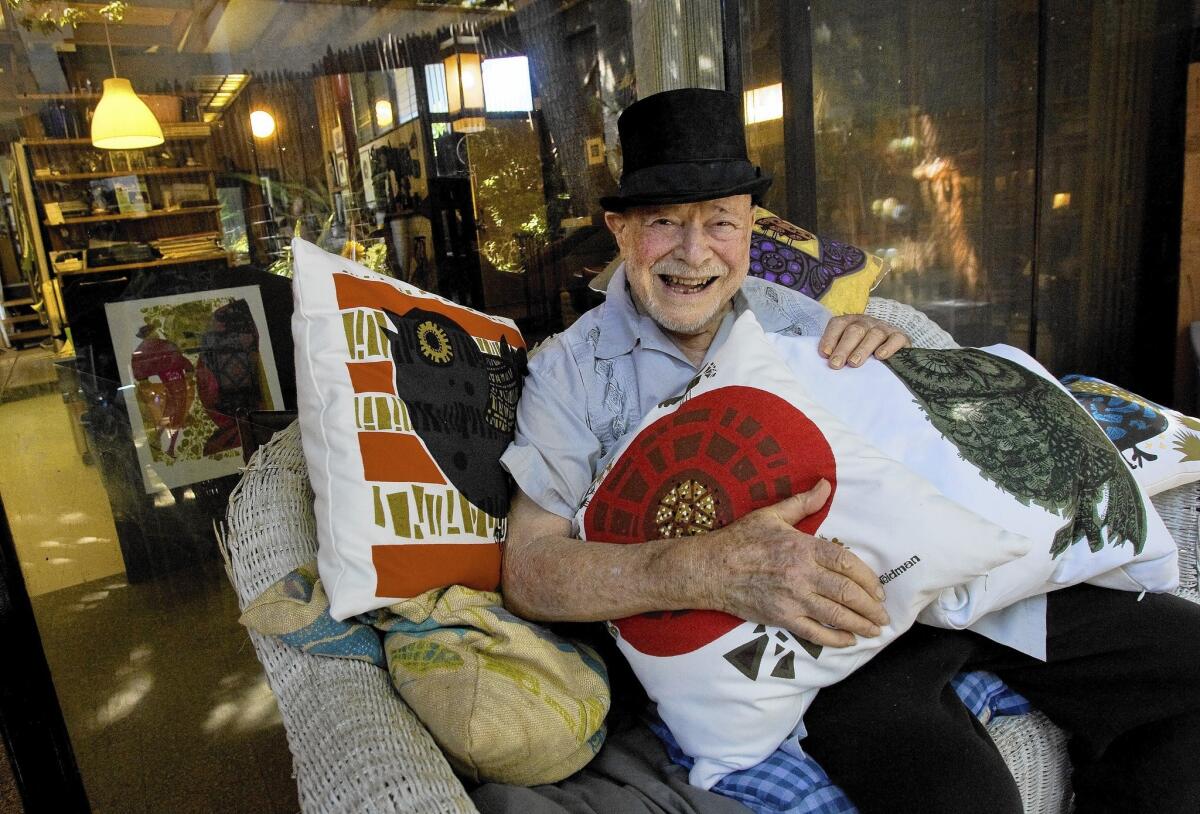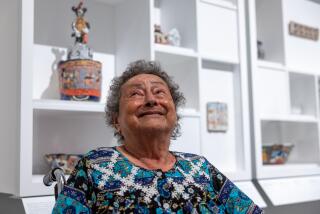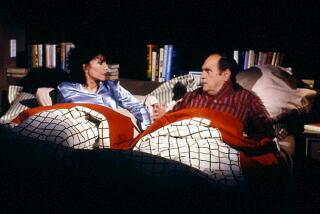David Weidman dies at 93; artist associated with Midcentury Modernism

Artist David Weidman worked on “Mr. Magoo,” “Gerald McBoing-Boing” and other animated cartoons in the 1950s and 1960s, but he was mostly a flop as a commercial artist. The thousands of silk-screen prints he made, by hand, hardly sold, even though some were priced at $10 and lower.
But then when he was in his 80s, the Midcentury Modern craze hit. Suddenly Weidman’s artworks that featured abstract pools of color, mosaic motifs and stylized depictions of animals and people were in demand. They were shown in galleries, embedded on textiles sold at Urban Outfitters and even used as props on the TV show that became the epitome of Midcentury chic, “Mad Men.”
“I am pleased,” he said of his delayed recognition in a 2010 Los Angeles Times interview. “I can’t say that I’m not.” But most of all, he was happy that artworks he stopped making in about 1980 had come to be accepted not just as retro objects, but as the creations of an artist with a distinct style.
Weidman, 93, died Wednesday at his home in Highland Park. The cause was congestive heart failure, said his daughter, Lenna Weidman.
He did not, like many artists who used the silk-screen technique, seek to copy sketches or paintings in making his works. Weidman (WEED-man) instead used the inherent attributes of the silk-screening process to make his original pieces. “I worked out a blotting technique,” he said in a interview last year for the Greater Long Beach blog before an appearance in that city. It involved using blocks of color and depictions of objects in varying degrees of transparency.
His resulting works resembled the kind of stylized backdrops he painted for early 1960s cartoons. New York Times writer Steven Kurutz, writing about the 2008 book “The Whimsical Works of David Weidman,” said the artworks “might bring back memories of childhood Saturdays spent in front of the TV with a bowl of cereal.”
Two Weidman prints, including one depicting stylized flowers, showed up on “Mad Men” behind the desk of the character Peggy Olson, played by Elisabeth Moss. “The style is very distinctive and indicative of that era,” said “Mad Men” set decorator Claudette Didul in a 2010 Times article. “They remind me of pictures I saw growing up.”
Weidman was born June 28, 1921, in the Belvedere Gardens area of what’s now East Los Angeles. He was enrolled in Garfield High School but transferred to Manual Arts because it offered more art classes. He got a scholarship to study at Otis Art Institute, but before he could enroll World War II broke out and he enlisted in the Navy, serving in the Pacific.
After the war he used the GI Bill to go to Jepson Art Institute in Los Angeles where his future wife, Dorothy, was teaching silk-screening. They married in 1953.
Weidman worked for several animation studios, often as a background painter, but was frustrated with the group process. Wanting to make his own art, he established a workshop in a building behind a liquor store on La Cienega Boulevard and started to turn out silk-screens. He found some success selling to corporate clients who wanted his prints to decorate interiors of hotels and other buildings.
But it was not the kind of personal art he wanted to make. “When clients began dictating to me the color and the subject, they took me off my rails,” he told Find Art magazine in an article published last month. Eventually, he morphed the business into custom framing.
Given the physical demands of the silk-screen process, he didn’t start making them again when his artwork got “discovered” around 2008. But at local events featuring his art, Weidman would arrive, pushing his walker and wearing his leather top hat, obviously delighted to be among young fans.
In addition to his wife, Dorothy Weidman, and daughter Lenna Weidman of Pasadena, he is survived by sons Josh Weidman of Portland, Ore., and Troy Weidman of Dublin, Calif.; brother Ralph Weidman of Los Angeles; sister Lillian Zimberg of Culver City and two grandchildren.
Twitter @davidcolker
More to Read
Start your day right
Sign up for Essential California for the L.A. Times biggest news, features and recommendations in your inbox six days a week.
You may occasionally receive promotional content from the Los Angeles Times.







